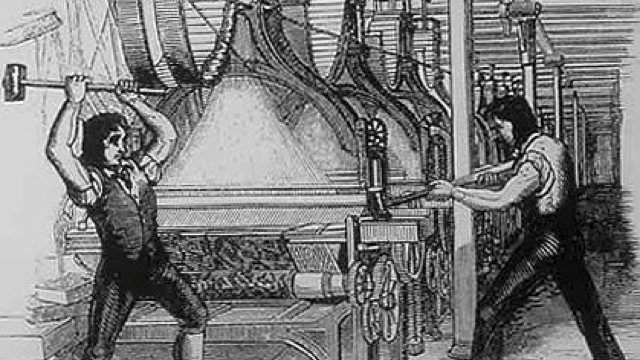Is It That Technology Changes Too Fast, Or Is The Government Holding Us Back?

There are two mistaken ideas about economics that, throughout history, significant numbers of people make again and again.
One is the Malthusian idea about diminishing resources. This has been around since Thomas Malthus wrote about humanity outgrowing its ability to produce food, which would inevitably lead to widespread famine according to Malthus. Of course, that proved not to be true. What Malthus didn’t account for was our capacity to get better at farming. New technology and new techniques have allowed us to grow food in places it wouldn’t grow before, and get more food out of each acre planted.
So, Malthus was wrong, but that didn’t stop a significant number of scientists, economists and political-types all wound up about “peak oil,” which was the idea that we would outgrow our capacity to produce energy. “Peak oil” was the impetus for a lot of the government spending on things like wind and solar, but it turns out the peak oil people were wrong too. Because, much like with farming, we’ve simply gotten better at finding and tapping into oil and gas reserves. Now America, which once had declining oil and gas production, is poised to become the top energy producer in the world.
The other idea is the idea that technology destroys jobs. Believe it or not, this one has been with us for about as long as technology has. Today we call people who are averse to embracing new technology “Luddites,” but historically that term refers to a labor movement in 19th century England. As the Industrial Revolution (which was less “revolution” than a gradual confluence of technological innovations) made manufacturing less labor-intensive, laborers were upset. Their jobs were being usurped, they believed, by new technologies. And, unfortunately, like labor movements they turned to violence to save their jobs. Ned Ludd, from whom we get the term Luddite, is supposed to have risen to fame by destroying manufacturing machines.
Of course, Ludd and his adherents were wrong. Technology didn’t steal the jobs, it just changed the jobs. Which is why we’re not still suffering from an oversupply of buggy manufacturers now that the automobile has made horses obsolete as a primary means of transportation.
Still, though, we have modern Luddites who argue that our current economic woes stem from the proliferation of new job-stealing technologies. In attempting to explain why this Great Recession we seem mired has been more protracted than previous recessions, the Associated Press blames technology:
Most of the jobs will never return, and millions more are likely to vanish as well, say experts who study the labor market. What’s more, these jobs aren’t just being lost to China and other developing countries, and they aren’t just factory work. Increasingly, jobs are disappearing in the service sector, home to two-thirds of all workers.
They’re being obliterated by technology.
Year after year, the software that runs computers and an array of other machines and devices becomes more sophisticated and powerful and capable of doing more efficiently tasks that humans have always done. For decades, science fiction warned of a future when we would be architects of our own obsolescence, replaced by our machines; an Associated Press analysis finds that the future has arrived.
What’s interesting is that the AP actually acknowledges this lengthy history of falsely blaming technology for job losses, but argues that this recession is different:
Technological innovations have been throwing people out of jobs for centuries. But they eventually created more work, and greater wealth, than they destroyed. Ford, the author and software engineer, thinks there is reason to believe that this time will be different. He sees virtually no end to the inroads of computers into the workplace. Eventually, he says, software will threaten the livelihoods of doctors, lawyers and other highly skilled professionals.
Many economists are encouraged by history and think the gains eventually will outweigh the losses. But even they have doubts.
“What’s different this time is that digital technologies show up in every corner of the economy,” says McAfee, a self-described “digital optimist.” “Your tablet (computer) is just two or three years old, and it’s already taken over our lives.”
Peter Lindert, an economist at the University of California, Davis, says the computer is more destructive than innovations in the Industrial Revolution because the pace at which it is upending industries makes it hard for people to adapt.
Is it really the technology that’s different? Is it that we’re developing new technologies faster now than ever before, or is it something else?
I think the sheer pace of modern technological innovation is no doubt a contributing factor, but shouldn’t we also be looking at government? It’s true that technology has never changed so quickly before, but it’s also true that our government has never been this big.
When I see the AP write that it’s “hard for people to adapt” to changing economic conditions, I can’t help but think all the new laws and regulations those trying to do the adapting must contend with.
“[B]y most estimates, there are at least 4,000 separate criminal laws at the federal level, with another 10,000 to 300,000 regulations that can be enforced criminally,” writes Radley Balko. “Just this year 400 new federal laws took effect, as did 29,000 new state laws.”
Maybe what’s making it “harder for people to adapt” to changing economic conditions isn’t so much how rapidly things are changing, but how much red tape is holding them back from adapting. Because what’s the idea? Attempt to slow the pace of technology to allow the economy to catch up?
Wouldn’t you rather unshackle the economy from the millstone of government so that it can keep up?







